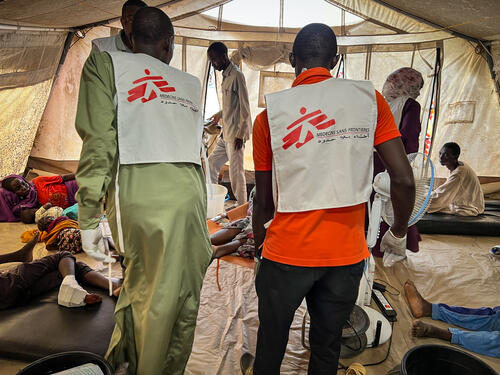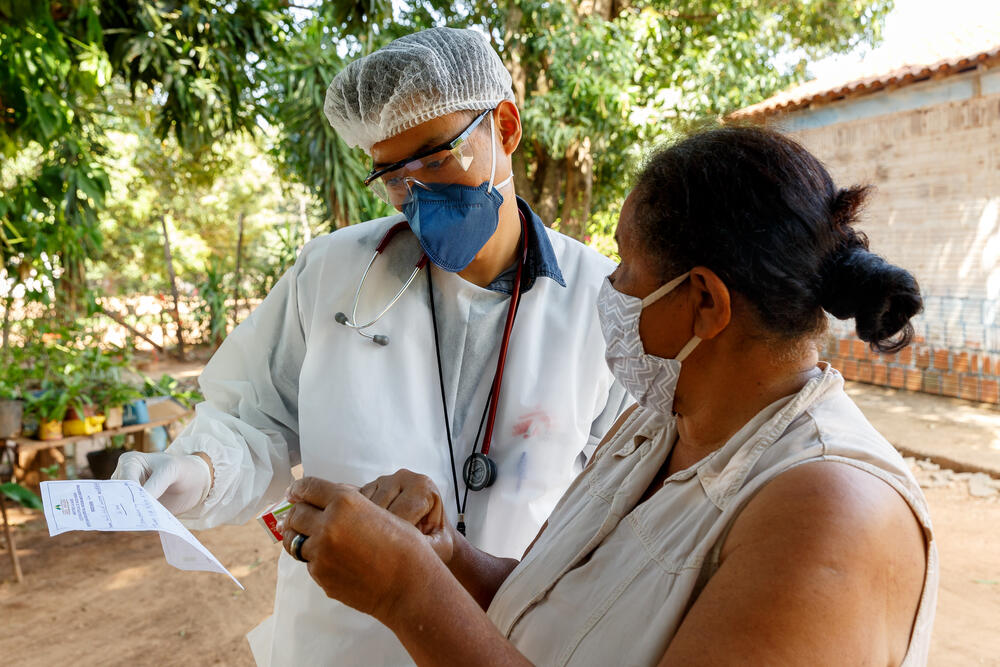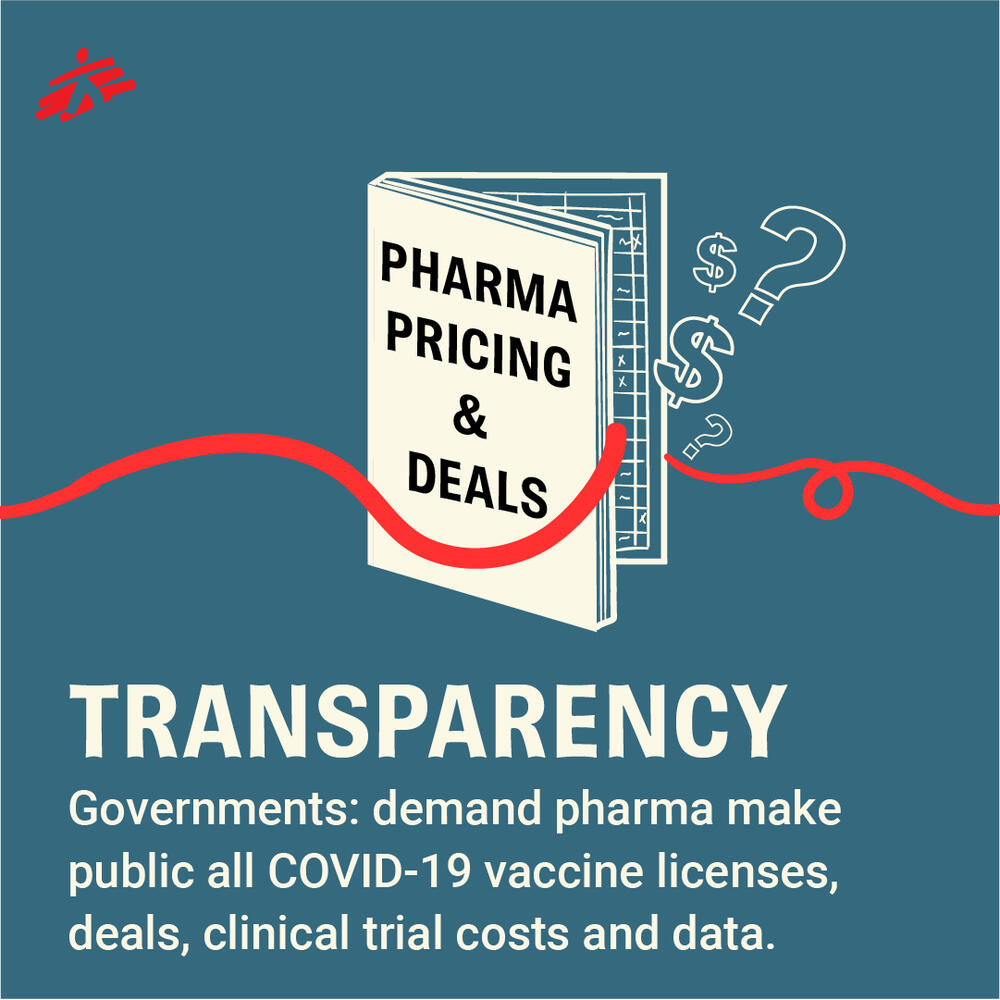Governments must demand pharma make all COVID-19 vaccine licensing deals public
Amid rapid developments in the search for a COVID-19 vaccine, Médecins Sans Frontières / Doctors Without Borders (MSF) is calling on governments including the UK to urgently demand transparency from pharmaceutical corporations on all COVID-19 vaccine licensing agreements, as well as clinical trial costs and data.
Billions of dollars of public, taxpayer money has gone towards the development of these potential vaccines.
A previous agreement revealed by the Financial Times showed that there are limits to UK-based pharmaceutical company AstraZeneca’s public ‘no profit’ commitments, and that the company has given itself the power to declare the pandemic over as soon as July 2021.
This means that, after July 2021, AstraZeneca could charge governments and other purchasers including the NHS high prices for a vaccine that was predominantly funded by the public.
The UK government alone has contributed £84 million to the development and manufacture of this vaccine.
AstraZeneca has gone so far as to state several times that the development of the vaccine will have no financial implications for the company since “expenses to progress the vaccine are anticipated to be offset by funding by governments and international organisations.”
The original exclusive license between AstraZeneca and Oxford University has still not been made public, the terms of which largely determine the terms of the company’s subsequent deals with other vaccine manufacturers around the world.
People with knowledge of the AstraZeneca-Oxford license have questioned AstraZeneca’s ‘no profit’ commitment, saying that AstraZeneca may charge as much as 20 percent more than the costs associated with producing the vaccine.

Our work saves lives
“As long as we don’t know what’s in these deals, pharma will continue to hold the power to decide who gets access when, and at what price”
Brazilian public research body Fiocruz took an important step towards more transparency by publishing online a license agreement with AstraZeneca to produce at least 100 million vaccine doses.
Although the agreement was published with redactions it nonetheless represents a step that should encourage other governments to follow suit and take action towards more transparency.
Other than the agreement with Fiocruz, sub-licenses with other manufacturers in South Africa, India and other countries have also not yet been disclosed.
Public scrutiny of the terms of these deals is critical to ensure equitable and affordable access to these future life-saving vaccines.
No place for secrets during a pandemic
Pharmaceutical corporations have a very poor track record of transparency across the board – from licensing deals and technology transfers to costs of R&D and clinical trial data – and the little information that has been revealed around AstraZeneca’s not-for-profit promises should be a warning sign that pharma cannot be trusted to act in the interest of public health.
“As long as we don’t know what’s in these deals, pharma will continue to hold the power to decide who gets access when, and at what price,” said Kate Elder, senior vaccines policy advisor for MSF’s Access Campaign.
“Without decisive action from governments demanding more transparency from companies, equitable access to COVID-19 vaccines is in jeopardy. The public has the right to know what’s in these deals – there is no place for secrets during a pandemic, there is too much at stake.”
“Despite repeated assurances from heads of state that any COVID-19 vaccine will be a global public good... it is clear that pharma cannot be trusted to act in the interest of public health, even in these unprecedented times”
The licensing deals struck for a number of other companies racing to develop COVID-19 vaccines also remain cloaked in secrecy, despite unprecedented levels of public funding.
Over US$12 billion has been poured into the research and development (R&D), clinical trials and manufacture of six front-runner candidate COVID-19 vaccines developed by AstraZeneca/Oxford University (over $1.7 billion) Johnson&Johnson/BiologicalE ($1.5 billion), Pfizer/BioNTech ($2.5 billion), GlaxoSmithKline/Sanofi Pasteur ($2.1 billion), Novavax/Serum Institute of India (nearly $2 billion), and Moderna/Lonza ($2.48 billion).
The UK, led by the Vaccine Taskforce, has made bilateral deals with five out of six of these companies, and in total has so far pre-ordered 350 million doses of potential future COVID-19 vaccines.
However, none of these deals have been made public, meaning millions of pounds of public funds being is being handed over to pharmaceutical companies without any transparency or accountability.
Vaccine developers must disclose trial costs and data
MSF also urged COVID-19 vaccine developers to disclose clinical trial costs and data. Without this information, it is impossible for people, treatment providers and governments to demand affordable prices and scrutinise critical safety and efficacy data.
Given that R&D and manufacturing costs have been largely – or entirely, in the case of AstraZeneca and Moderna – offset by public contributions, the public deserves to see a transparent breakdown of these costs and data.
“Despite repeated assurances from heads of state that any COVID-19 vaccine will be a global public good, and despite claims that we’re seeing industry at its best, the reality is that up to this point it is clear that pharma cannot be trusted to act in the interest of public health, even in these unprecedented times,” said Roz Scourse, policy advisor for MSF’s Access Campaign.
“Even with billions of dollars of public, taxpayer money paying for these vaccines, and billions of lives at stake, we continue to be left in the dark, leaving us scrambling to determine critical information such as the price and supply of any future COVID-19 vaccines, and what this means for equitable access.”
Governments including the UK must be bold at this critical juncture for the health of billions of people, take responsibility for the billions of public dollars that they have handed over for these vaccines, and demand that pharmaceutical corporations urgently make public all licenses, agreements, clinical trial costs and data related to COVID-19 vaccines.
Access to essential medicines
One third of the world does not have access to essential medicines.
In the poorest parts of Africa and Asia, this figure rises to half the population. We challenge the high cost of medicines and the absence of treatment for many of the diseases affecting our patients.
Too often we cannot treat patients because the medicines are too expensive, or they are no longer produced.
Sometimes, the only drugs we have are highly toxic or ineffective and nobody is looking for a better cure.
As a medical humanitarian organisation, it is fundamentally unacceptable that access to essential medicines is increasingly difficult, particularly for the most common global infectious diseases.

